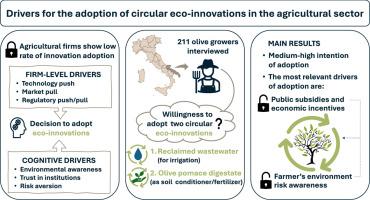Drivers for the adoption of circular eco-innovations in agriculture: insights from a field experiment on olive growers
IF 6.4
Q1 ENVIRONMENTAL SCIENCES
引用次数: 0
Abstract
Circular economy is emerging as a key approach for transitioning to a more sustainable economic model. However, understanding how to facilitate the transition to a circular economy remains a critical challenge. This study analyses the drivers for the adoption of circular eco-innovations in the agricultural sector by considering both firm-level factors and cognitive characteristics of firms’ managers. Specifically, the willingness to adopt two selected circular eco-innovations was assessed through face-to-face interviews involving a sample of 211 olive growers in Apulia region (Italy). The two tested circular eco-innovations consist of the use of olive pomace digestate as soil conditioner/fertilizer and the use of reclaimed wastewater for irrigation. Data analysis was performed by estimating a bivariate ordered-response probit model. Findings revealed that farmer’s cognitive characteristics, particularly environmental risk awareness, play a key role in the path of adoption. Therefore, a full circular transition in agriculture can be achieved only through a significant shift in farmers’ mind-set, a process that takes time and needs to be supported by tailored policy measures.

农业采用循环生态创新的驱动因素:来自橄榄种植者田间试验的见解
循环经济正在成为向更可持续的经济模式过渡的关键途径。然而,了解如何促进向循环经济的过渡仍然是一项重大挑战。本研究通过考虑企业层面因素和企业管理者的认知特征,分析了农业部门采用循环生态创新的驱动因素。具体来说,采用两种选定的循环生态创新的意愿是通过面对面的访谈来评估的,其中包括意大利普利亚地区的211名橄榄种植者。经过测试的两项循环生态创新包括使用橄榄渣消化液作为土壤改良剂/肥料和使用再生废水进行灌溉。通过估计二元有序响应概率模型进行数据分析。研究结果表明,农民的认知特征,特别是环境风险意识,在采用路径中起着关键作用。因此,农业的全面循环转型只能通过农民思维方式的重大转变来实现,这一过程需要时间,需要有针对性的政策措施支持。
本文章由计算机程序翻译,如有差异,请以英文原文为准。
求助全文
约1分钟内获得全文
求助全文
来源期刊

Resources, conservation & recycling advances
Environmental Science (General)
CiteScore
11.70
自引率
0.00%
发文量
0
审稿时长
76 days
 求助内容:
求助内容: 应助结果提醒方式:
应助结果提醒方式:


